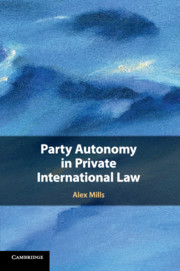46 results
The Private Side of Transforming Our World: UN Sustainable Development Goals 2030 and the Role of Private International Law. Ralf Michaels, Verónica Ruiz Abou-Nigm, and Hans van Loon, eds. Cambridge, UK: Intersentia, 2021. Pp. xiv, 574.
-
- Journal:
- American Journal of International Law / Volume 117 / Issue 4 / October 2023
- Published online by Cambridge University Press:
- 30 October 2023, pp. 750-756
- Print publication:
- October 2023
-
- Article
- Export citation
Correlating Automated High-Throughput ADF-STEM and 4D-STEM Imaging for the Characterization of Irradiation-Induced Defects
-
- Journal:
- Microscopy and Microanalysis / Volume 28 / Issue S1 / August 2022
- Published online by Cambridge University Press:
- 22 July 2022, pp. 2064-2066
- Print publication:
- August 2022
-
- Article
-
- You have access
- Export citation
7 - Choice of Law in Contract
-
- Book:
- Party Autonomy in Private International Law
- Published online:
- 31 July 2018
- Print publication:
- 16 August 2018, pp 313-389
-
- Chapter
- Export citation
Dedication
-
- Book:
- Party Autonomy in Private International Law
- Published online:
- 31 July 2018
- Print publication:
- 16 August 2018, pp v-vi
-
- Chapter
- Export citation
Contents
-
- Book:
- Party Autonomy in Private International Law
- Published online:
- 31 July 2018
- Print publication:
- 16 August 2018, pp vii-xii
-
- Chapter
- Export citation
2 - Historical and Theoretical Foundations of Party Autonomy
-
- Book:
- Party Autonomy in Private International Law
- Published online:
- 31 July 2018
- Print publication:
- 16 August 2018, pp 29-90
-
- Chapter
- Export citation
11 - Conclusions
-
- Book:
- Party Autonomy in Private International Law
- Published online:
- 31 July 2018
- Print publication:
- 16 August 2018, pp 521-530
-
- Chapter
- Export citation
Copyright page
-
- Book:
- Party Autonomy in Private International Law
- Published online:
- 31 July 2018
- Print publication:
- 16 August 2018, pp iv-iv
-
- Chapter
- Export citation
4 - Choice of Court Agreements and Non-Contractual Claims
-
- Book:
- Party Autonomy in Private International Law
- Published online:
- 31 July 2018
- Print publication:
- 16 August 2018, pp 175-208
-
- Chapter
- Export citation
10 - Choice of Non-State Law
-
- Book:
- Party Autonomy in Private International Law
- Published online:
- 31 July 2018
- Print publication:
- 16 August 2018, pp 491-520
-
- Chapter
- Export citation
3 - Choice of Court Agreements: Effects and Effectiveness
-
- Book:
- Party Autonomy in Private International Law
- Published online:
- 31 July 2018
- Print publication:
- 16 August 2018, pp 91-174
-
- Chapter
- Export citation
8 - Choice of Law in Non-Contractual Relations
-
- Book:
- Party Autonomy in Private International Law
- Published online:
- 31 July 2018
- Print publication:
- 16 August 2018, pp 390-454
-
- Chapter
- Export citation
6 - Arbitration Agreements
-
- Book:
- Party Autonomy in Private International Law
- Published online:
- 31 July 2018
- Print publication:
- 16 August 2018, pp 263-312
-
- Chapter
- Export citation
5 - Limits on Party Autonomy in Choice of Court
-
- Book:
- Party Autonomy in Private International Law
- Published online:
- 31 July 2018
- Print publication:
- 16 August 2018, pp 209-262
-
- Chapter
- Export citation
Bibliography
-
- Book:
- Party Autonomy in Private International Law
- Published online:
- 31 July 2018
- Print publication:
- 16 August 2018, pp 531-568
-
- Chapter
- Export citation
1 - Introduction
-
- Book:
- Party Autonomy in Private International Law
- Published online:
- 31 July 2018
- Print publication:
- 16 August 2018, pp 1-28
-
- Chapter
- Export citation
Acknowledgements
-
- Book:
- Party Autonomy in Private International Law
- Published online:
- 31 July 2018
- Print publication:
- 16 August 2018, pp xiii-xiv
-
- Chapter
- Export citation
Index
-
- Book:
- Party Autonomy in Private International Law
- Published online:
- 31 July 2018
- Print publication:
- 16 August 2018, pp 569-580
-
- Chapter
- Export citation
9 - Limits on Party Autonomy in Choice of Law
-
- Book:
- Party Autonomy in Private International Law
- Published online:
- 31 July 2018
- Print publication:
- 16 August 2018, pp 455-490
-
- Chapter
- Export citation

Party Autonomy in Private International Law
-
- Published online:
- 31 July 2018
- Print publication:
- 16 August 2018



